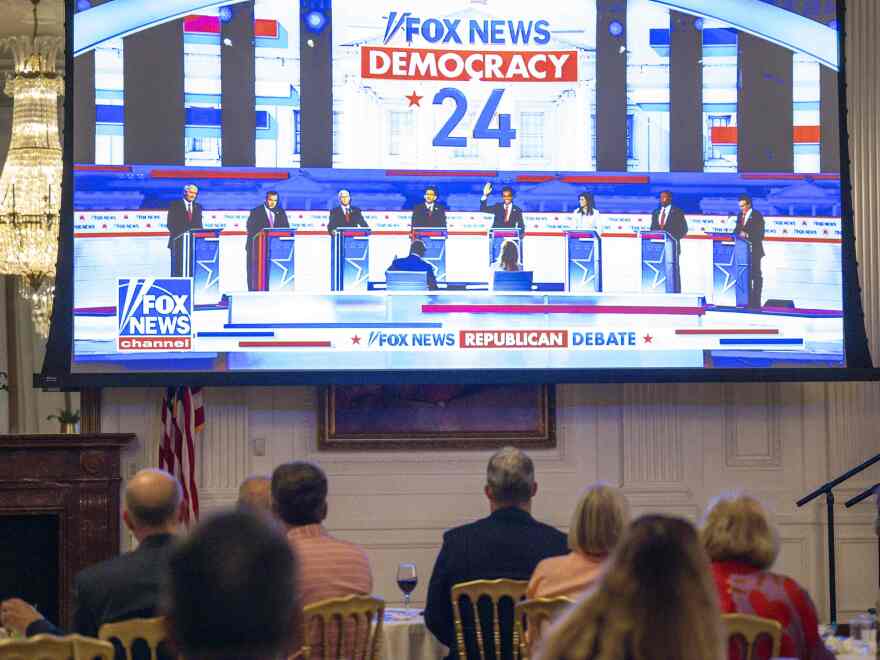Republicans are still looking at a crowded field to challenge President Biden for the 2024 presidential election and most will face off in Simi Valley, Calif., Wednesday night for the second GOP debate.
Late Monday night, the Republican National Committee confirmed the names of seven presidential candidates who will participate. Not on the list is former President Donald Trump, who is preparing to skip — again.
Here's everything you need to know about the second GOP debate:
When and where to watch
The second presidential debate will air at 9 p.m. ET from the Ronald Reagan Presidential Library. It will be simulcast on the FOX News Channel and available to FOX Nation subscribers. Viewers can also watch on Univision, which is the partnering network, as well as on Rumble, a video-sharing platform with a primarily right-wing audience.
Stuart Varney and Dana Perino of Fox News will moderate the debate, along with with Univision's Ilia Calderón.
Follow NPR for debate updates and analysis.
Who will be there? And who won't?
The debating candidates had to meet criteria set by the RNC, which included reaching specific polling numbers and donor metrics and meeting Federal Election Committee deadlines. They also had to sign a pledge agreeing to support the eventual party nominee.
Gov. Doug Burgum — The North Dakota governor has cut taxes, rolled back transgender rights and is expected to emphasize his small-town roots. During the first debate, Burgum took a common conservative tack of attacking climate solutions, stressed domestic job production and securing the southern border.
Gov. Chris Christie — The former New Jersey governor is launching another bid for the Republican nomination. Christie has been expected to position himself as the conservative alternative to Trump after breaking ties with the former president following the Jan. 6 attack on the Capitol.
"I'm looking at this as a real moment for change for our party. And I got into this race because I felt like no one was making that case," Christie told NPR in an interview after the first debate. "No one was willing to take the case directly to Donald Trump as to why he and through his conduct had disqualified himself for ever being president of the United States again."
Gov. Ron DeSantis — The Florida governor has been at the center of Trump attack ads and also faced Republican criticism over laws signed in the state to limit abortion access and his response to immigration. He has widely been seen as the most viable GOP opponent to Trump, but his campaign has faced challenges including staffing turnover.
Former South Carolina Gov. Nikki Haley — Haley was the ambassador to the United Nations under Trump and was the first to challenge the former president. Despite a strong performance during the first GOP debate, her campaign has not taken off.
Former Vice President Mike Pence — Pence has a strong appeal to white Christian evangelicals, a sizable portion of the Republican base. He has also denounced the former president's involvement in attempts to overturn the 2020 election results. Pence specifically criticized Trump's pressure for him to refuse to count certain Electoral College votes, a theory that Pence rejected as unconstitutional. Pence has continued to take swing at his former boss while hitting the campaign trail.
Vivek Ramaswamy — He is the youngest GOP candidate and highlights his age as an asset. The former tech and finance executive has been a prominent voice in conservative circles, arguing against the environmental, social and governance (ESG) movement and against "woke"-ism. Ramaswamy received a boost following the first GOP debate.
Sen. Tim Scott — Another South Carolina contender, Scott brings a diverse background and upbringing to the white-dominated Republican Party. During the first debate, Scott said he would complete the border wall, increase domestic job creation, and said states like California and New York can't be allowed to "have abortions on demand" until birth.
Trump is eligible but choosing not to attend, despite being the current frontrunner for the nomination.
Not eligible for the debate: Arkansas Gov. Asa Hutchinson didn't make the cut for a second debate showing. Michigan businessman Perry Johnson, former Texas Congressman Will Hurd, conservative talk show host Larry Elder and Texas pastor Ryan Binkley.
What is Trump doing instead?
Despite meeting donor and fundraising thresholds, the former president will head to Michigan that day to speak to striking union autoworkers as they call for better contract terms from the Big Three automakers.
Trump's forthcoming trip is the latest play in his pitch as an attractive alternative to President Biden, the incumbent Democrat who won the UAW's coveted endorsement in 2020. Biden also won a solid majority of the votes of union households in that election, helping him carry battleground states including Michigan, Pennsylvania and Wisconsin, all states that Trump had won in 2016. Biden joined the picket line on Tuesday.
Still, the UAW is holding Biden's feet to the fire to help them reach a deal. But the chance that a Trump endorsement from the union is forthcoming is unlikely. UAW President Shawn Fain has said on more than one occasion that another Trump presidency would be "a disaster." Responding to Trump's planned visit, Fain did not mince words.
"Every fiber of our union is being poured into fighting the billionaire class and an economy that enriches people like Donald Trump at the expense of workers," Fain said. "We can't keep electing billionaires and millionaires that don't have any understanding what it is like to live paycheck to paycheck and struggle to get by and expect them to solve the problems of the working class."
Copyright 2023 NPR. To see more, visit https://www.npr.org.









